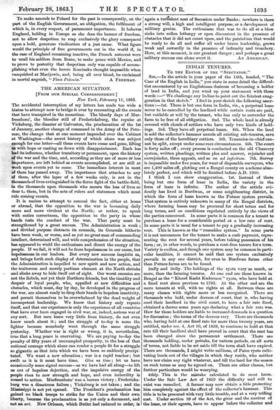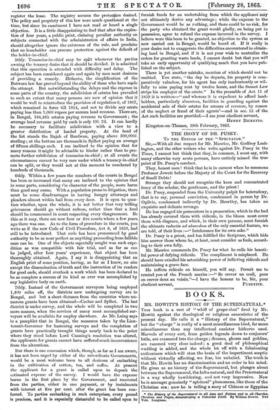INDIAN TENURES.
To THE EDITOR OF THE "SPECTATOR."
Snt,—In the article in your paper of the 14th, headed, " The Case of the English in India," you state in some detail the difficul- tiea encountered by an Englishman desirous of becoming a holder of land in India, and you wind up your statement with these words :—" We challenge any Indian to point out the faintest exag- geration in that sketch." I find in your sketch the following asser- tions :-1st. There is but one form in India, viz., a perpetual lease never to be cancelled by the landlord while certain rents are paid, but voidable at will by the tenant, who has only to surrender the farm to be free of all obligation. 2nd. The whole land is already covered with clouds of settlers who have only two kinds of hold- ings. 3rd. They have all perpetual leases. 4th. When the land is sold the collector's hammer annuls all existing sub-tenures, save only those of the hereditary cottiers. 5th. Tenancies-in-chief can- not be split, except under some rare circumstances. 6th. The court is forty miles off ; every process is conducted on the old Chancery system, written pleadings, written plea and answer, rejoinder and surrejoinder, three appeals, and so on ad infinitum. 7th. Survey is impossible under five years, for want of disposable surveyors, who are 1,400 miles off, plotting out a Bengal county on a scheme abso- lutely perfect, and which will be finished before A.D. 1900.
I think I can show exaggeration. 1st. Instead of there being but one form of lease in India, the variety in the form of lease is infinite. The author of the article evi- dently has lived in Burdwan, or some neighbouring district, in which the form of lease known as the Putnee system prevails. That system is entirely unknown in many of the Bengal districts, where farming leases may be procured for short terms and for long terms, and on conditions regulated entirely by the views of the parties concerned. In some parts it is common for a tenant to purchase a lease for a considerable period at a low rate of rent. In some parts it is usual for a tenant to pay a gradually increasing rent. This is known as the " russuddee system." In some parts it is not uncommon for the tenant to make a cash payment, repre- senting the rent for several years, before taking possession of his farm ; or, in other words, to purchase a rent-free tenure for a term. Variety is endless, and though one system may be common in parti- cular localities, it cannot be said that one system exclusively prevails in any one district, for even in Burdwan farms other than Putnee farms are to be found.
2ndly and 3rdly. The holdings of the ryots vary as much, or more, than the fanning tenures. At one end are those known in Bengal as the " Khood Kasht Kudeemee " ryots, who have held at a fixed rent since previous to 1783. At the other end are the mere tenants at will, with no rights at all. Between these are many classes with rights more or less recognized. There are thousands who hold, under decrees of court, that is, who having sued their landlord in the civil court, to have a fair rate futed, obtained a decree some years ago declaring what a fair rate was. How far these holders are liable to increased demands is a question for discussion ; the terms of the decrees vary. There are thousands who, having held at one fixed rate for more than twenty years, are entitled, under sec. 4, Act 10, of 1859, to continue to hold at that rate till their landlord shall have proved in court that the rent has been changed since the permanent settlement. There are thousands holding, under pottahs, for various periods, on all sorts of terms, not liable to be set aside till the term shall have expired. There are thousands, I might write millions, of Paiee ryots culti- vating lands out of the villages in which they reside, who neither have nor claim any right whatever, and till the land for the season on such terms as may be agreed on. There are other classes, but further particulars would be wearying.
4thly. This is the mistake calculated to do most harm. Under the Sale Law Act of 1859 the difficulty said still to exist was remedied. A farmer may now obtain a title protecting him completely against the effect of the collector's hammer. .This title is to be procured with very little trouble, and at a very trifling cost. Under section 39 of the Act, the giver and the receiver of the lease, or their agents, have to appear before the collector and
register the lease. The registry secures the protection desired. The policy and propriety of this law were much questioned at the time, but since its enactment I have not read or heard a single objection. It is a little disappointing to find that after the expira- tion of four years, a public print, claiming peculiar authority on subjects connected with the administration of affairs in India, should altogether ignore the existence of the rule, and proclaim that no leaseholder can procure protection against the default of tho holder-in-chief.
5thly. Tenancies-in-chief may be split whenever the parties owning the tenancy desire that it should be divided. It is admitted that this operation is attended with difficulty and delay. The subject has been considered again and again by men most desirous of providing a remedy. Hitherto, the simplification of the Butwara law has proved beyond the ability of those who have made the attempt. But notwithstanding the delays and the expense in some parts of the country, the subdivision of estates has prevailed to such an extent that many persons are now of opinion that it would be well to reintroduce the provision of regulation 6, of 1807, which remained in force till 1814, and not to divide any estate paying less than 1,000 rupees per annum land revenue. There are, in Bengal, 184,485 estates paying revenue to Government ; the average land revenue paid by each is only 191. 7d. It can hardly be necessary to facilitate subdivision with a view to a greater distribution of landed property. At the head of the list stands the Rajah of Burdwan, paying above 300,0001. sterling ; at the bottom are thousands in Sylhet paying an average of fifteen shillings each. I am inclined to the opinion that for many reasons it might be advisable to hinder rather than to pro- mote further subdivision of tenancies-in-chief ; at all events the circumstances cannot be very rare under which a tenancy-in-chief can be split, or they would not at this moment be numbered by hundreds of thousands.
6thly. Within a few years the numbers of the courts in Bengal has been so increased that many are inclined to the opinion that in some parts, considering the character of the people, more harm than good may ensue. With a population prone to litigation, there must be some disadvantages in having hungry attorneys and pleaders almost within hail from every door. It is open to ques- tion whether, upon the whole, it is not better that very trifling grievances should go without redress, rather than that a feud should be commenced in court respecting every disagreement. Be this as it may, there are now four or five courts where a few years ago there was one. As to the form of procedure in the courts, you write as if the new Code of Civil Procedure, Act 8, of 1859, had still to be introduced. That code has been pronounced by good authority to be as near perfect as anything proceeding from fallible man can be. One of the objects especially sought was such expe- dition as was compatible with fair trial, and as far as can be judged, after four years' experience, that object has been thoroughly obtained. Again, I say it is disappointing that an English print of some position, having, as far as I know, no aim except the dissemination of truth and the instruction of its readers for good ends, should overlook a work which has been declared to be as complete a success of its kind as ever was accomplished by any legislative body on earth.
7thly. Instead of the Government surveyors being employed 1,400 miles off, the districts now undergoing survey are in Bengal, and but a short distance from the countries where nu- merous grants have been obtained—Cachar and Sylhet. The last district is under survey, and the whole will be completed in two more seasons, when the services of many most accomplished sur- veyors will be available for employ elsewhere. As Mr. Laing says in a pamphlet that in Bengal, the measures taken by the Lieu- tenant-Governor for hastening surveys and the completion of grants have practically brought things nearly back to the point where they stood before Lord Canning's resolution was altered, the applicants for grants cannot have suffered much inconvenience from the alterations.
But there is one concession which, though, as far as I am aware, it has not been urged by either of the subordinate Governments, would be a most welcome boon to all desirous of embarking in the cultivation of cotton, tea, and coffee. At present the applicant for a grant is called upon to deposit the estimated expense of the survey. I would have the expense borne in the first place by the Government, and recovered from the parties, either in one payment, or by instalments with interest at five per cent. after the grant has been con- ferred. To parties embarking in such enterprises, every pound is precious, and it is especially distasteful to be called upon to
furnish funds for an undertaking from which the applicant rosy not ultimately derive any advantage ; while the expense to the Government would be as rothing, and there could be no risk, for the party who obtained the grant would gladly, on being put in possession, agree to refund the expense incurred in the survey. I believe were this boon to be granted, no objection to the system as now carried out in Bengal, would be heard of. If it really is your desire not to exaggerate the difficulties encountered in obtain- ing land in Bengal, and if it is not your wish to neutralize the orders for granting waste lands, I cannot doubt but that you will take an early opportunity of qualifying much that you have pub- lished on the subject.
There is yet another mistake, mention of which should not be omitted. You state, " the day he departs, his property is com- paratively valueless, for his agent has only inadvertently or wil- fully to miss paying rent by twelve hours, and the Sunset Law strips his employer of the estate." In the preamble of Act 11 of 1859 it is written--" and whereas it is expedient to afford land- holders, particularly absentees, facilities in guarding against the accidental sale of their estates for arrears of revenue, by reason of the neglect or fraud of their agents"—and in sec. 15 of the Act such facilities are provided.—I am your obedient servant,































 Previous page
Previous page